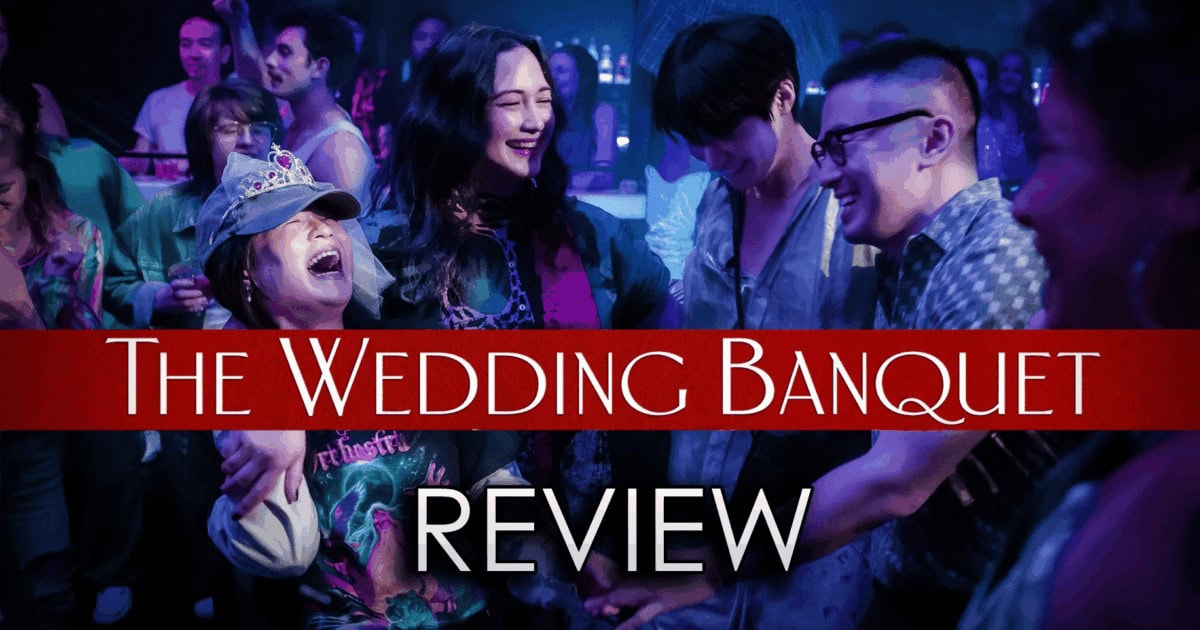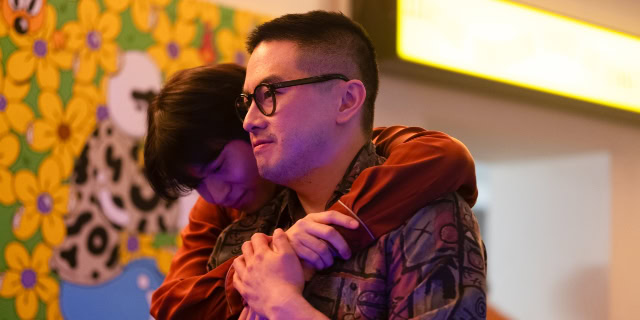‘The Wedding Banquet’ Review: A Rom-Com with a Big Heart

The Wedding Banquet, as a remake, reintroduces a classic narrative rarely offered by Hollywood lately. The film has a catchy plot where the main leads hatch a scheme, and the more the scheme unfolds, the less it works. Romantic comedies used to do it all the time. For example, How to Lose A Guy in 10 Days permitted Kate Hudson to torture Matthew McConaughey into disliking her character, only for the reverse to come true because how can anyone dislike Kate Hudson?
The Wedding Banquet incorporates a similar plot device but never feels burdened by rom-com cliches. Surprisingly, the film takes a deep breath in numerous places to allow the characters to reveal themselves. For a movie with all the ingredients to fully embrace a sellout-style romantic comedy, there is rich tenderness to the film.
What is The Wedding Banquet about?
Based on the 1993 film by award-winning filmmaker Ang Lee, The Wedding Banquet (directed by Andrew Ahn) centers on two gay men and two gay women who form a tight-knit friendship through their shared identities.
Chris (Bowen Yang) and Min (Han Gi-Chan) navigate a sweet but complicated relationship. Min is an artist with an expiring student visa and is the sole beneficiary of his family’s business in Korea, a responsibility Min does not wish to accept. His loving partner, Chris, is apprehensive about pushing their commitment further despite his great affection for Min.
Angela (Kelly Marie Tran) and Lee (Lily Gladstone) are a couple dedicated to the possibility of parenthood. Similar to Chris and Min’s relationship, there is an existing conflict in their pursuit of a child. Lee has been the victim of multiple unsuccessful IVF treatments, and the doctor implies it might be a consequence of age. Lee suggests Angela try the IVF treatment, but doing so exposes Angela’s ambivalence about having a kid.

Their friendship with Chris and Min offers a possible third path. Min needs to be married to stay in the United States, and Lee and Angela need money for another treatment. Min proposes to pay Angela in exchange for a marriage that allows him to avoid returning to Korea to manage his family’s large company. The only problem is Min’s grandmother suspects the trickery and decides to fly to the United States to call his bluff and throw a high-profile wedding banquet.
Bleecker Street’s film balances a variety of threads
One of my favorite comedies is Crazy Stupid Love. The film, which was written by This is Us writer and creator Dan Fogelman, uses a variety of characters to explore the complexities of enduring love. At the same time, Fogelman’s screenplay earnestly sprinkles familiar rom-com clichés within the interweaving string of characters. Andrew Ahn and James Schamus’ script follows a similar format, focusing not on multiple couples but on the singular relationships within their friendships.
The relationships between the couples reveal a depth to each friendship dynamic. While Min’s grandmother embarks on crafting the banquet, the script allows the viewer to see how all four of these characters have their connection. Min shares a unique bond with Lee, just as he does with Angela. Chris and Lee have their own meaningful relationship, and so on. For example, Chris and Angela have a night of bonding after they both upset their partners for different reasons. The small touches allow the viewer to feel the authenticity of the shared friendship.
Youn Yuh-Jung delivers a surprisingly sincere performance as Min’s grandmother, Jah-Young. She begins as an antagonist in the film, placing Min in an uncomfortable position of possibly upending his life in the United States to work for a family business that means nothing to him. But the more we learn about his grandmother and Jah-Young’s history in Korea, the more we understand she has a greater empathy for Min.
The interactions between Min and his grandmother enrich the film with intriguing insights into marriage customs and traditions in Korean culture. These cultural elements lead to one of the film’s most humorous moments, featuring Kelly Marie Tran’s tomboyish character as she navigates the ceremonial bride routines for the sake of appearances.
Andrew Ahn’s remake is a rom-com with a big heart
Similar to most rom-coms, The Wedding Banquet exhibits a few genre conventions. Eventually, turmoil ensues, and the romantic lead (or leads) must return to sweep their intended romantic partner off their feet. Some of these stereotypical elements are present; the only difference is that the movie does not end with the “Happily Ever After” kiss. Instead, it concludes on a realistic and precious note that could make viewers yearn for more.
As The Wedding Banquet approaches its final lap, the tenderness on display will make viewers want to keep watching over the characters. The audience will want to remain engaged and see what happens next in their lives. We fall in love with their chemistry and experiences, eager to witness the next possible battle before them. As a reviewer who generally does not favor romantic comedies, one can recognize these qualities as a triumph.
Have you seen The Wedding Banquet yet? What do you think of it? Let us know on social media @mycosmiccircus or @TheCosmicCircus.com on Bluesky.
Check out: A Nice Indian Boy Combines Heart, Humor, and Hope


